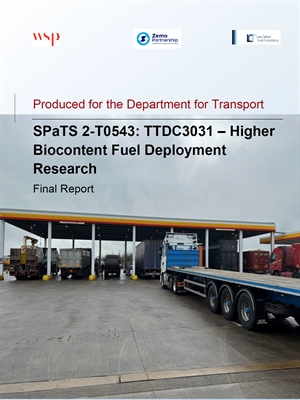New report for DfT shows potential of higher biocontent fuels to deliver lower emissions
Sun 28 September 2025
View all news

A study for the Department for Transport by WSP in association with Zemo Partnership and the Low Carbon Truck Consultancy provides the most comprehensive assessment to date of opportunities and challenges for scaling higher biocontent fuels (HBFs) in heavy-duty vehicles (HDVs). The report examines the challenges to the wider uptake of higher biocontent fuels by fleet operators and provides recommendations to Government about measures that can be taken to increase uptake.
The report covers biodiesel blends (B20–B100) and renewable paraffinic diesel such as Hydrotreated Vegetable Oil (HVO). The study demonstrates their potential for lifecycle greenhouse gas (GHG) emissions reductions of up to 90% compared with fossil diesel.
Drawing on engagement with vehicle manufacturers, operators, and the supply chain, the report identifies technical barriers—such as cold-weather performance, filter blockage risks, and storage maintenance—but finds that many concerns are now resolved through OEM approvals and operational experience.
The central obstacle to greater uptake remains Total Cost of Ownership (TCO): HVO typically costs 20–40% more than B7 diesel, with operators estimating a rebate of ~24p/litre is needed for parity. The limited availability of refuelling infrastructure (there are 71 public HVO sites and none for high-blend FAME) also constrains adoption.
Internationally, most successful rollouts have combined mandates with fiscal incentives (eg fuel duty relief), underscoring the importance of government intervention . Recommended measures for the UK include raising Renewable Transport Fuel Obligation (RTFO) targets, fuel duty discounts, fleet rebates, enhanced capital allowances, and stronger procurement policies.
Information campaigns to highlight sustainability certification, counter misconceptions, and map refuelling locations are also advised. The report provides case studies—from Metroline buses on B20 to Hackney Council’s HVO fleet— which illustrate significant GHG and NOx reductions without major operational drawbacks .
The report concludes that while zero emission vehicles remain the long-term solution, higher biocontent fuels can deliver immediate, scalable emissions cuts if supported by targeted policy and fiscal levers.
Related Links
< Back to news list